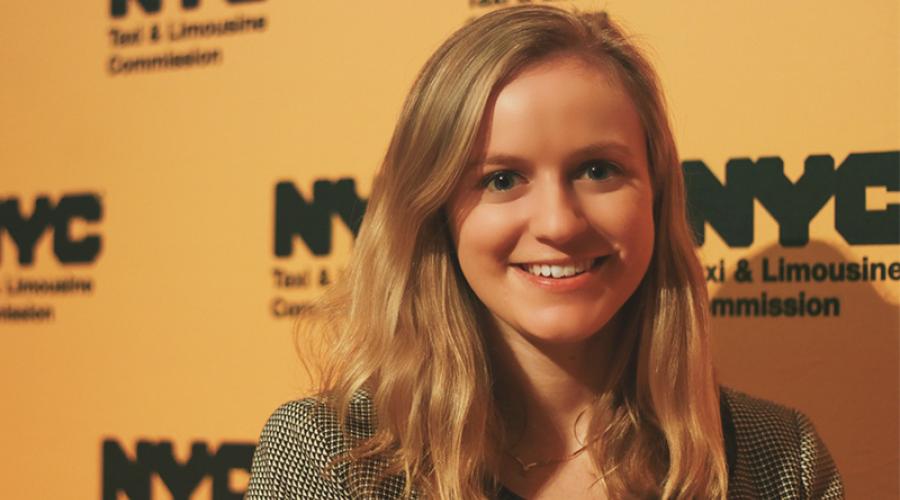
Sonia Guior ’15
After graduation, Sonia Guior ‘15 spent several years working for a nonprofit research institute in Princeton, focusing on policy evaluation and survey research. But, with the goal of working in New York City in mind, she joined the New York City Taxi and Limousine Commission in 2017.
She is currently the director of external and intergovernmental affairs at the commission, overseeing outreach to hundreds of thousands of drivers, vehicle licensees and car service companies. In this role, Guior also works with elected officials and their teams on constituent and legislative matters. Her work with the commission has sent her to every corner of the city, and it has allowed her to meet hundreds of taxi drivers, Uber and Lyft drivers, passengers, elected officials and advocates. This fall, she will begin pursuing a Master of Public Administration degree, part-time, at New York University, where she can build upon the educational foundation she gained at the ILR School.
Guior, whose mother, two uncles, a great aunt and five cousins attended Cornell, was a member of the Big Red women’s sailing team that made the transition from club to varsity status during the 2014-15 season.
How Did ILR Change You?
ILR gave me the tools to connect my seemingly unrelated interests as a young undergraduate – government, politics, labor, urban planning, transportation, sociology – and develop a career involving each of these topics. My coursework instilled in me a deep understanding of the employer/employee relationship, as well as the legal protections that workers and unions earned through collective action. I developed an interest in urban politics and the public sector in New York, thanks in part to a course on the U.S. public sector.
During my senior year and first post-graduate summer, I worked as a research fellow for the Labor Leading on Climate initiative. This work allowed me to connect my passion for transportation and cities with my interests in labor, inequality studies, and policy solutions to climate change. Several years later, federal policymakers introduced the Green New Deal, which focuses on many of the same concepts – green jobs, investment in infrastructure such as high-speed rail, and climate justice. ILR taught me that creative solutions are possible – labor and climate can be aligned, and we can build our economy and fight climate change concurrently.
How are you making an impact through your experiences at ILR?
I’m an employee, a manager, a union member, and regulator of a rapidly evolving industry. My work at ILR prepared me to be all of these at once, and to think critically about my role in labor and the workplace. At the TLC, I’m proud to be part of a team that has developed groundbreaking policies. In 2018, the TLC passed a first-of-its-kind driverincome and transparency rule package, which led to increased earnings for thousands of independent contractors working for companies like Uber and Lyft. New York was the first city in the US to create a new pay standard for app-based drivers, and I’m proud to work for an agency that has worked to innovate in the field of gig-economy regulation.
As director of external and intergovernmental affairs at the Taxi and Limousine Commission, I work closely with thousands of drivers – sharing information in at least 10languages about new commission policies, rules and programs. I believe that my ILR education gives me a unique perspective as a regulator and external affairs professional, and my background in labor relations allows me to better understand the needs and interests of the thousands of commission licensees.
How might the mission of ILR help shape the next 75 years of work, labor and employment?
As more jobs become gigs, as more traditional union membership slows but new organizing, such as the Fight for 15, takes off, and as millions of workers are figuring out how to do their jobs remotely, ILR’s mission is as crucial as ever. It’s an exciting time to be interested in labor and the workplace, but also a time that demands quality research and informed policymaking. As platform-based gig work grows, how will health care and benefits change or become more portable? Will workplaces provide more family-friendly support, such as guaranteed maternal and paternal leave, and will policymakers introduce free or subsidized childcare?
Will remote work become the new normal for “white collar” and office-based employees, or will offices see a revival once the COVID-19 pandemic subsides? Will states opt to define gig workers as employees, or will a third “dependent worker” category be introduced? These are only some of the questions that come to mind when considering the future of work and labor. ILR will continue to inform policy decisions on all of these topics, educating the next generation of labor leaders. I am excited to learn from them!
